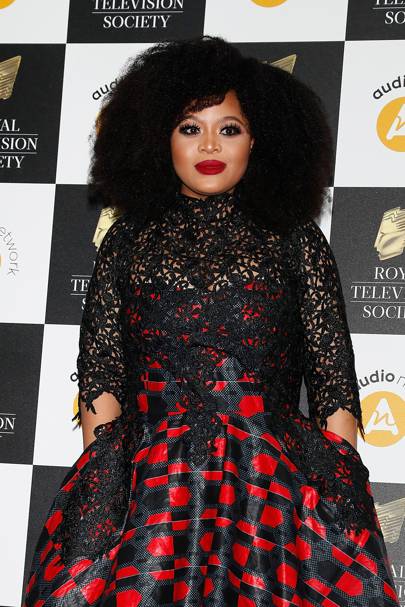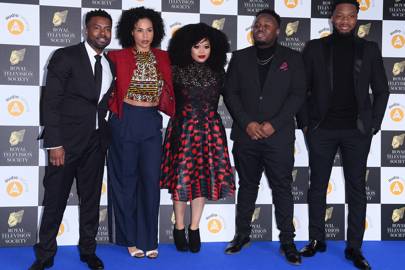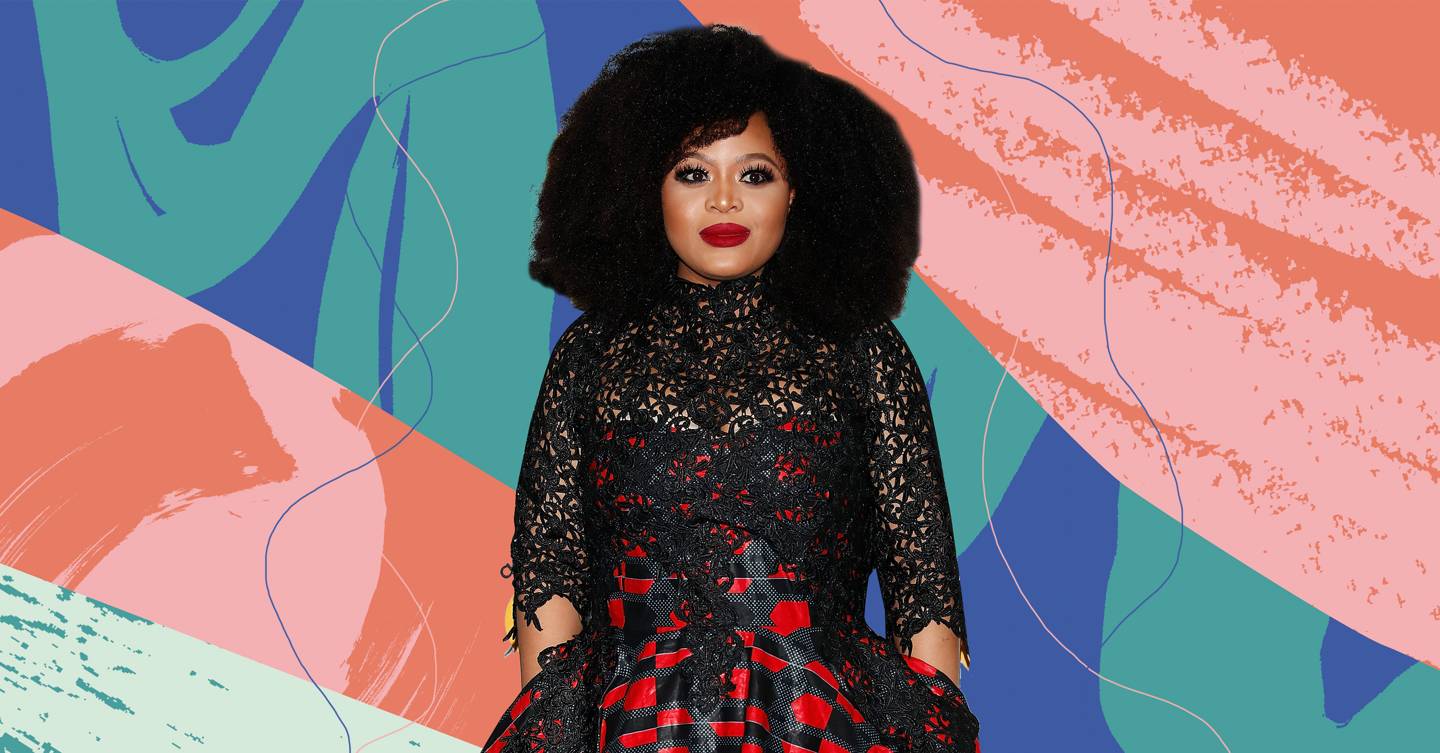It’s not every day you interview someone and the iconic Bodger and Badger come up in conversation – “they made mashed potato sexy,” – but not every interwiee is Gbemisola Ikumelo.
Gbemisola is a rare and remarkable storyteller who doesn’t just act, she directs and writes and gives a cracking chat, too. It’s no surprise the comedian has received not just one but two BAFTA TV nominations this year, one for her side splitting brilliance in the BBC comedy show, Famalam in the Best Female Performance in a Comedy category where she will battle against the likes of Phoebe Waller-Bridge and for Best Short Form Programme for her one-off BBC comedy show, Brain in Gear. It comes as BAFTA TV Awards nominations for BAME performers increased by 167 per cent.
Brain in Gear should and hopefully will become a full comedy series in its own right given it’s hilarious and at times dark exploration of Remi, a rather anxious single woman who battles against the conflicting advice from her inner thoughts, personified by two characters, Boss Bitch Remi and Dark Remi.
Here as Gbemisola emerges at 12.30pm, after going to sleep at 5.30am due to her overactive mind, talks about navigating comedy in light of Black Lives Matter and the hurdles she hasn’t just overcome she’s shattered…

Getty Images
Firstly, please tell me that Brain in Gear is going to become a series?
I hope so! There are good conversations happening. It was kind of like a calling card going, “Hey guys, I can do these things. Please give me a show.” We’re just in the rooms via Zoom right now, the conversations are good and positive! I’m optimistic for the future of it.
I felt like my thought processes were so seen in this show…
Brain in Gear is my life! I’ve had all those kinds of conversations. I don’t think I have poor mental health, but I live alone, I am creative, so I’m weird anyway and I talk to myself all the time. I catch myself going, “If someone had a camera in this room right now, they would lock me up.”
The whole thing came from the sketch that I’d written called Inner Fat Girl. I wrote it after I had the flu, I was basically in bed for a week. Afterwards I was walking to the shops, I was walking uphill and literally my inner fat girl was going, “Babes, why are we doing this? Why didn’t we drive?” And I’m like, “It’s a five-minute walk.” And then inner fat girl is like, “Yeah, but you have a car. Why are we walking?” I’m like, “You know what? I need to get healthier.” I was having this conversation back and forth with myself about why I’m out of breath walking uphill with one part of me going, “This is really bad, I’m really ashamed of myself.” And the other part going, “Why are you fat-shaming yourself?”
Dark Remi in the show is this representation of our dark thoughts, those intrusive thoughts you have like when you’re on the Tube, and you see a train coming and you’re like, “What if I fell or I jumped?” I’m not suicidal but those thoughts do randomly pop into my head and so, I just wanted to see what that would look like manifest in this real world. I also feel like when we’re young, when we’re not pensioners, we don’t like to talk about being lonely and I think everyone especially in London or big cities, I think we’re all perpetually lonely. I feel like I want to touch on some of those things in this, about loneliness, but also put in fart jokes!

Getty Images
What have your internal discussions around body image been like?
I’ve been every stage of weight. I’ve probably been on a diet since I was 10 years old or something. Body image is a constant battle, just going, “You’re okay, you’re looking good.” Right now, corona has been kind of good for me, because I have been able to control what I eat. But there’s a constant thing of looking in the mirror, trying not to recoil and be repulsed. It’s a battle of, “You’re all right today. You’re all right.” Then other days have been like, “You’re hideous.” Again, I feel even the most beautiful people go through it, I assume. I don’t think anyone is always saying, “I’m a perfect specimen.” Maybe Channing Tatum, I don’t know. But no one else. I think we all struggle with that.
Do you think comedy and exploring your emotions in this way gives you a better relationship with yourself?
Yeah, I do. I think when I was doing Famalam, I was getting a lot of these big characters and I thought, “I wonder if I would get these roles if I was thinner or I looked a different way?” There was an insecurity about that. But what was actually really great was that I didn’t have to play roles that I had to think about looks. I could play a fat boy who was just obsessed with food, I could play old women and I realised that there was something really freeing about it not being about my looks and I could transform. I think there’s a lot of pressure on actresses particularly to look pretty, to not do ugly cry face. There’s something really great about comedy where you can just be ugly if you need to be, for the joke.
There is a lot of reexamination of comedy happening right now, and rightly so, in light of the changing times we find ourselves in after the Black Lives Matter movement. How difficult is it to navigate comedy in this new setting?
I manage it by just finding the funny. I’m going to be honest. If I felt I was so bound by, “How is this going to come across?” I don’t think I would ever write anything. A lot of my humour is on that cusp of being probably quite offensive anyway, because I do think it’s about discussion, and what’s seen as funny, and what’s seen as close to the bone. I’m always intrigued by that sweet spot. I do think comedy is a thing of the now. So, when you look back at comedy, you go, “That was the comedy of that time.” I think there were people who even back then were a bit like Little Britain was maybe not the best.
I think if I look at it like that, I wouldn’t as a person writing comedy, make anything. I feel like it’s not my job to necessarily engage in that. I think that’s the audience’s job. But one thing I do find important is, you as a comedian need to know who is the author of the joke, and who is the butt of the joke. You need to know if you are laughing at a group of people, or you’re laughing with them and I think that’s so important. And if you don’t know the difference, then maybe the joke isn’t yours to tell.
There are some things we can get away with in Famalam, and things we can say, because that’s our joke. It’s like I can make fun of people in my family. I think when you’re looking at marginalised people, the joke has to be with the marginalised. They have to be the authors of those jokes, because that’s their pain. But when its other people going, “Ha, look at that marginalised group? Don’t they do this funny thing?” Then you haven’t told the joke right and that’s because you’re not the author of that joke.
Comedy has always been a boys’ club. There are moments where you realise as a Black woman there are certain spaces where you question whether or not your voice is safe. There are constantly times when I see myself getting second-guessed especially when the people who are in the room whose job it is to write the cheques or whatever, might not connect with a joke. You’re having to constantly Blacksplain, or Africansplain and say, “This is a thing in our community, and maybe that joke will go over your head, but there will be people in the audience who will be really like, ‘I feel seen by this moment.'”
Then there are times when you’re constantly monitoring your tone, monitoring how you come across. So, until there are more people who are writing the cheques or who are making the decisions who come from diverse backgrounds, are those gatekeepers, there’s going to constantly be this balancing act that one does and trying to break through ceilings. It’s a challenge.
How do you feel about the concept, ‘a seat at the table’?
I remember saying to the producer of Famalam at one point when I was working on another project after it, I said, “This job is great. It’s great. I do feel like I have a seat at the table. But the difference between working on a show like Famalam where I have a real explicit voice, and this other thing that I’m working is that I felt like I’m a guest in this house. I’m a well-treated guest, I have a beautiful guest bedroom. But in Famalam, it felt like not only was it is my house but I’m inviting guests in too.”
I always knew I was never going to fit into a traditional box of how a career was going to go. I was always thinking, “let me just carve out my own spaces, because no one is going to give me a play to direct. I’m going to write it, and I’m going to raise the money and make that happen. No one’s going to give me this.” I’ve always called myself a hustler in this industry so I’m definitely on the camp of, I will sit at some tables and be really grateful to be there, but that’s not my end goal, to be welcomed onto this table.
When have you felt the most respected, seen and safe on a set?
I definitely would say Brain in Gear. I will say there’s different versions of feeling safe and seen. For example, I always talk about the trauma of black hair on set in theatre. There’s real trauma that gets built up if you’ve had years of having your hair been viewed as a problem for the department, rather than it being part of the job. It’s part of the show. I remember doing a pilot in the U.S. for A League of Their Own and it’s the first time really, I had seen so many black people across hair and makeup. It was bewildering.
I remember saying to the person who was doing my hair at the end, “I’m bursting into tears because it’s the first time I felt really safe.” Normally I’ve got a routine of how I deal with my hair on set. I deal with it, and then I tell the person, “Okay, my hair is already prepped, so you just have to give me the wig, or you give me a budget and I’ll go find someone who can do my hair.” You’re having to make these decisions. With Brain in Gear it was the most holistic version of that where it wasn’t just the hair. I got to insist. I went, “I’d like a black hair and makeup team, and make it happen.” And it happened.
Do you feel like with having that experience and the discussions we’re having right now, more hopeful than ever about the future?
I do – I really do. I’m probably in the camp where I think, corona has been a horrible, horrible thing but I think out of every dark thing there can be good that comes out of it. People cannot be distracted; Black Lives Matter has been the most prominent ever in this country. You were forced to engage in a way that when your life is going as normal, you can just kind of go, “I’ve got this thing to deal with.” We are making huge long-lasting strides in this industry.
To be a bit controversial, I think my only fear in terms of where this goes is that the decisions are being made for the right reasons, where we want to be inclusive because we want more diverse voices, because we want to make money. Diverse voices are bankable, because diverse voices are fun, exciting and increase the breadth of storytelling, not because we have white guilt and we should probably do it because what then happens is you get these scenarios which I’m not really a fan of, of people going, “I’m stepping down from this role and giving it to a poor black actor somewhere, because I feel guilty now about my part in this.”
Okay, fine, maybe you’ve been voicing a black character and you’re not black. Now moving forward, let’s start creating opportunities and roles where black people can voice black characters. Otherwise it feels performative to me and sometimes I feel can be almost a bit damaging it’s almost saying that we need a handout, and we don’t need a handout. What we need are the people, the gatekeepers to really see is, not in a totalistic way, but to see our talent, and value that. Not for anyone to go, “Here’s a job for you. Here’s a job because I don’t want it anymore.” I don’t want your sloppy seconds.
It’s also about being an ally without being a martyr, in that sense…
I think that’s really well put. We all are struggling actors out here, and we all need to work. I don’t need you to not come into an audition because I feel like I could stand a pretty good chance up against you. You need to be in competition with the same people to prove that it’s based on talent!
You’re in this situation with two BAFTA fricking nominations honey. Does this success take on new meaning for you given what you have been through?
So much! I’ve not taken any of this for granted, especially because I know what I came from. When people go, “You came from the gutter,” with me there were times where I was pretty close to it. I’ve lived in real poverty. So, to look back at that world and to see where I’m at now, I cannot take any of it for granted. It’s so amazing and I’m so thankful.
Famalam is now streaming on BBC iPLayer
